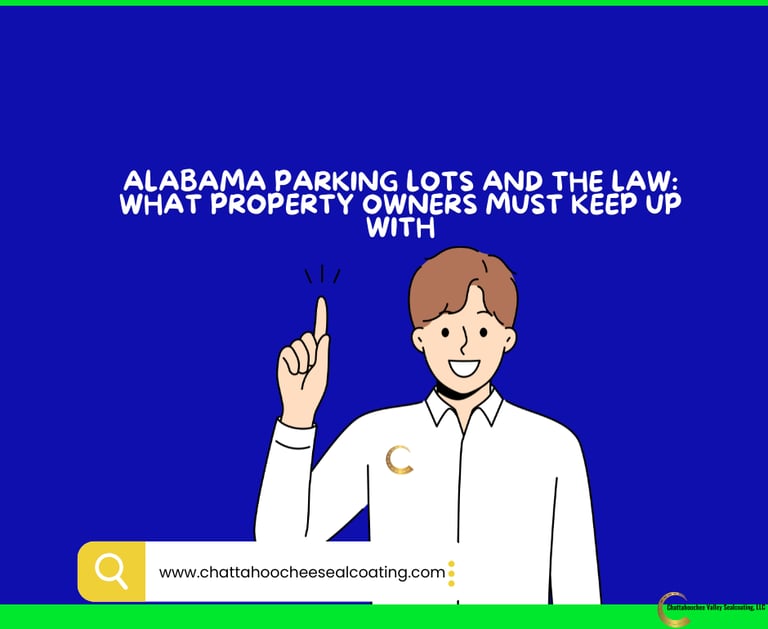Alabama Parking Lots and the Law: What Property Owners Must Keep Up With
Maintaining a parking lot in Alabama isn’t just about curb appeal—it’s a legal responsibility. From ADA compliance and safety hazards to fire lane markings and liability risks, property owners are expected to meet a wide range of regulations. Whether you manage a business, HOA, school, or commercial site, this guide breaks down the laws you must follow to stay compliant, avoid fines, and protect the people who use your lot every day.
Chattahoochee Valley Sealcoating
8 min read
What Laws Govern Parking Lot Maintenance in Alabama?
Alabama property owners are often surprised to learn that no single law governs parking lot upkeep—it’s a combination of federal mandates, state regulations, and local codes. From the Americans with Disabilities Act (ADA) to municipal zoning ordinances and stormwater management rules, multiple agencies have authority over your pavement. Failing to understand these overlapping requirements can lead to expensive violations, permit delays, or even lawsuits. The key for Alabama business and property owners is to know which rules apply and when they need to be enforced—or risk getting caught in a legal gray area.


Are Alabama Business Owners Legally Required to Maintain Parking Lots?
Yes—if your lot is used by the public, you are legally obligated to maintain it in a safe, accessible, and code-compliant condition. This includes patching potholes, maintaining clear striping, ensuring ADA accessibility, and addressing any hazards that could cause injuries. Under premises liability laws in Alabama, the burden of care falls on the property owner or operator. If someone trips on a crack, falls in a pothole, or can’t access your entrance due to poor layout, you could be held financially responsible—even if you didn’t know the hazard was there. That’s why regular inspections aren’t just good practice—they’re your legal defense.
How Alabama’s Premises Liability Law Affects Your Parking Lot
Under Alabama law, property owners owe a “duty of care” to anyone who enters their premises for business purposes. That includes maintaining the exterior—especially the parking lot—in a reasonably safe condition. If someone is injured due to negligence, like poor lighting or uneven pavement, the property owner could face a personal injury lawsuit. And because Alabama follows contributory negligence rules, even minor oversight could cost you the entire case if you're found even 1% at fault. This legal framework makes proactive maintenance and documentation crucial for commercial and multifamily property owners across the state.
What Happens If Someone Gets Hurt in My Parking Lot in Alabama?
If a customer, tenant, or visitor is injured in your parking lot, they may have grounds to sue under Alabama’s tort laws. These lawsuits often center around negligence—whether you knew about the hazard or should have known. Alabama courts look at factors like how long the issue was present, whether repairs were attempted, and if the problem had been reported by anyone else.
Here’s what can increase your liability:
Ignoring visible damage like potholes or broken curbs
Failing to address drainage or pooling water
Poor lighting in high-traffic areas
Inadequate signage for pedestrian walkways
The best defense is a documented maintenance plan that proves you’ve taken action to prevent harm.
Do Local Governments in Alabama Inspect Commercial Parking Lots?
Yes—depending on the city or county, your lot may be subject to inspection for zoning, drainage, ADA compliance, and environmental impact. In cities like Montgomery, Phenix City, or Auburn, commercial developments must often pass final grading and striping inspections before receiving a certificate of occupancy. Additionally, certain stormwater runoff requirements must be met, especially if your parking lot is part of a larger paved area. Failing these inspections can delay permits or lead to costly rework. Always check with your local planning and zoning department before resurfacing or restriping a commercial lot in Alabama.
What Safety Hazards Must Be Addressed in Alabama Parking Lots?
In Alabama, parking lots must be free of conditions that could cause foreseeable harm to the public. This includes potholes, crumbling curbs, broken concrete, pooling water, and improperly lit areas. Even temporary hazards, like construction debris or unmarked barriers, can create liability. Courts have consistently held property owners responsible for failing to address known dangers—or for not performing reasonable inspections that would have uncovered them.
To minimize risk, Alabama property owners should routinely check for:
Uneven pavement or height changes
Faded crosswalks or missing directional arrows
Obstructions in walkways or fire lanes
Poor visibility at entrances and exits
How Strictly Is the ADA Enforced in Alabama Parking Lots?
The Americans with Disabilities Act is a federal law, but its enforcement happens at both national and local levels—including in Alabama. Property owners who fail to provide compliant accessible parking spaces can face legal action from advocacy groups or individual citizens, often without any prior warning. Alabama has seen a rise in ADA lawsuits targeting businesses with improperly striped lots, missing van spaces, or ramps that don’t meet slope requirements. Even small violations—like a sign mounted too low—can result in penalties. The best approach is prevention: audit your parking lot annually, and bring in professionals who understand federal ADA guidelines as well as local inspection trends.
Do Alabama Cities Enforce Stormwater Runoff Rules for Parking Lots?
Yes—especially for commercial and industrial lots over a certain square footage. Parking lots are a major source of impervious surface runoff, which can overwhelm municipal drainage systems and contribute to flooding or pollution. In Alabama, local governments often require stormwater mitigation systems like retention ponds, bioswales, or permeable pavers. Failing to manage runoff can lead to violations of your city’s environmental codes—and in some areas, you could be required to retrofit your lot with new drainage solutions. Before expanding or repaving, always consult your local environmental or building department to stay ahead of these evolving regulations.
How Can Poor Lot Maintenance Impact My Commercial Insurance in Alabama?
Insurance providers in Alabama consider parking lot condition a factor when underwriting policies for general liability, commercial property, and even workers’ comp. If your insurer discovers recurring claims linked to parking lot injuries or damage, you could face premium increases—or worse, denial of coverage. Some policies even contain clauses that limit liability if negligence is proven. For example, if a customer trips on an unpatched pothole and there’s no record of recent inspections, your carrier may decline to pay the claim. Maintaining your lot isn’t just good for safety—it’s part of risk management that directly impacts your bottom line.
Are HOAs in Alabama Liable for Damaged or Neglected Parking Lots?
Absolutely. Homeowners’ associations that manage private roads, shared driveways, or parking lots are considered responsible for maintaining those areas to a safe and legally compliant standard. In Alabama, courts have held HOAs liable for accidents caused by poor pavement conditions, lack of signage, or inaccessible parking stalls. Even if residents are aware of the issues, it’s the HOA’s duty to address complaints promptly and document all maintenance activity. Regular inspection schedules and transparent budgeting for lot repairs are essential parts of fulfilling that legal duty—and avoiding costly legal disputes with residents or guests.
Are There Legal Requirements for Line Striping in Alabama Parking Lots?
While there’s no statewide line striping statute in Alabama, most local governments enforce striping standards through zoning, fire code, and ADA compliance requirements. Commercial properties must clearly mark accessible stalls, fire lanes, and traffic flow indicators. If a property is subject to inspection (e.g., during a business license renewal or construction approval), faded or missing markings could result in non-compliance citations. Additionally, private lawsuits have been won in Alabama when confusing or unmarked traffic patterns contributed to injury or damage. Fresh, clearly painted striping isn’t just a best practice—it’s a legal safety measure.



Do Fire Lanes in Alabama Parking Lots Have to Be Marked?
Yes—Alabama fire codes require that designated fire lanes be marked clearly and remain unobstructed at all times. These zones are often required near building entrances, loading docks, or multifamily housing units. Fire departments in cities like Montgomery and Auburn may inspect fire lane markings during annual property evaluations. The markings must typically include red curbs, “NO PARKING – FIRE LANE” lettering, and reflective paint visible day or night. Failure to properly mark and maintain these areas could delay emergency response and lead to steep fines or revoked occupancy permits.
Are There Minimum Lighting Standards for Parking Lots in Alabama?
Yes, and they vary by jurisdiction. Most Alabama municipalities follow Illuminating Engineering Society (IES) guidelines, which recommend minimum foot-candle levels in commercial lots to prevent crime and accidents. Poorly lit areas can increase liability risk, especially if someone is injured due to a fall or assault. Insurance companies also evaluate lighting conditions when underwriting commercial policies. Alabama law doesn’t require you to flood your lot with light—but it does expect you to eliminate obvious dark spots near walkways, entrances, and parking areas. Updating outdated lighting can reduce risk and improve visibility for drivers and pedestrians alike.
What Are My Responsibilities for Ice or Snow in Alabama Parking Lots?
Even though Alabama rarely experiences extreme winter weather, property owners are still responsible for keeping parking lots safe during ice, snow, or freezing rain events. This includes spreading salt, clearing walkways, and marking slippery zones. In the eyes of the law, once you're aware of a hazard, you're expected to take “reasonable action” to fix it. If someone slips and falls and your lot wasn’t treated—even if snowfall is rare—you could still be liable. Smart property managers in Alabama keep salt or de-icer on hand during winter months and develop a basic plan for inclement weather cleanup.
How Can I Make My Parking Lot Safer for Pedestrians Under Alabama Law?
Pedestrian safety is a critical part of your legal responsibility as a property owner. Alabama law requires that parking lots provide clear, accessible paths from parked vehicles to the building entrance. This includes marked crosswalks, curb ramps, and unobstructed walkways. Accidents involving pedestrians in lots often lead to high-dollar lawsuits—and many stem from design flaws like lack of visibility, no signage, or improper traffic flow.
To improve pedestrian safety in your lot, consider:
High-contrast crosswalk striping
Pedestrian crossing signs
Traffic calming features like speed bumps
Adequate lighting along walkways
These updates not only reduce liability—they also create a more welcoming, professional environment.
What Kinds of Signs Are Required in Alabama Parking Lots?
Parking lot signage is more than just good communication—it’s part of legal compliance in Alabama. Required signs may include ADA-accessible parking signs, fire lane warnings, speed limit postings, directional arrows, and stop signs at internal intersections. Signage must be legible, properly mounted (usually at least 60 inches off the ground), and placed in a way that complies with both ADA and local municipal codes. Lack of proper signage can be interpreted as negligence in personal injury cases, particularly when pedestrian or vehicle collisions occur. If you're re-striping or resurfacing, make sure your signs are up to date and reflect current legal standards.
Can I Be Sued Over Poor Pavement Conditions in My Lot?
Absolutely—and it happens more often than most Alabama property owners think. Cracks, potholes, and broken surfaces create tripping hazards and damage vehicles. Under Alabama tort law, you can be held liable if you knew (or should have known) about the issue and didn’t take reasonable steps to fix it. Even minor cracks that collect water or debris can become safety issues over time. Courts typically ask:
Was the condition obvious and dangerous?
Was there sufficient time to correct it?
Did the owner fail to inspect or repair the hazard?
A well-maintained lot is your best legal shield.
Are Delivery Zones or Loading Areas Regulated in Alabama?
Yes—especially in commercial zones, multifamily complexes, and schools. Delivery and loading zones must be clearly marked, easily accessible, and separate from pedestrian traffic whenever possible. While Alabama doesn’t have a single standard for these zones, most local fire codes and commercial zoning regulations require designated areas for emergency and delivery access. If delivery trucks block ADA pathways or obstruct fire lanes, the property owner—not the driver—is typically held liable. Mark these zones with clear striping and signage to avoid citations, injuries, or fines.
How Do I Handle Property Lines and Shared Parking Agreements Legally?
In Alabama, shared parking arrangements between businesses or properties must be clearly defined in writing. This is especially common in strip malls, office complexes, or joint-use facilities. Conflicts often arise when maintenance responsibilities, snow/ice removal, or ADA compliance duties aren’t clarified in advance. If a customer is injured in a shared lot, the legal fallout can get complicated fast—especially if both parties claim the other was responsible. To avoid disputes or lawsuits, property owners should:
Survey exact property lines
Clarify legal access agreements
Assign maintenance responsibilities in contracts
Update shared-use permits with local authorities if required
Why You Should Document Every Maintenance Task on Your Lot
Keeping a detailed log of maintenance isn’t just smart—it’s your legal safety net. In Alabama, documentation can make or break a case if someone files a claim related to your parking lot. Courts look favorably on property owners who can show a pattern of reasonable care. Maintain a dated record of inspections, repairs, service calls, and improvements.
Include the following in your lot maintenance log:
Photos of damage before/after repairs
Dates of striping, sealcoating, or crack filling
ADA signage or layout updates
Service provider invoices or reports
This simple habit can save thousands in legal costs—and prove you’re running a well-managed property.




